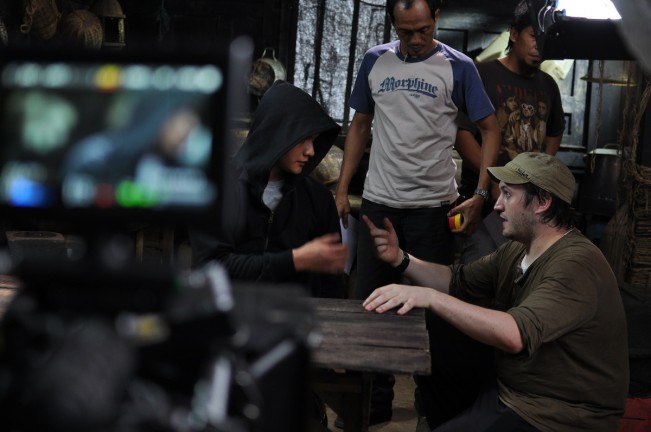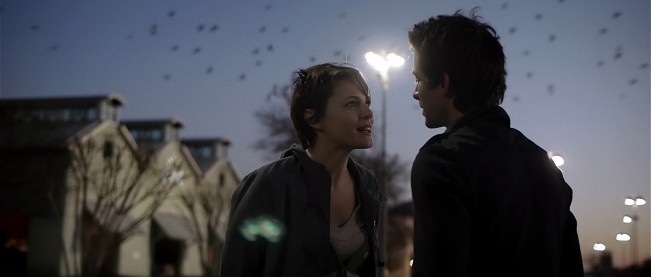Movie City Indie Archive for January, 2013
2012 FYC Screenplay: ZERO DARK THIRTY
 The last of the year’s PDF downloads here.
The last of the year’s PDF downloads here.
Picturing THE RAID 2 In Production
 These stills come from a single, non-action scene of The Raid 2, but Gareth Evans is generous with small bits of information at his Twitter account. “Amazing steadicam work earlier. Huge shot. Got it and wrapped. Tonight reunites me with Prakoso in something of a tender scene for him.” “19 scenes out of 103 done so far. Close to a fifth of the way through in terms of content, but only 15% of the way through the schedule.”
These stills come from a single, non-action scene of The Raid 2, but Gareth Evans is generous with small bits of information at his Twitter account. “Amazing steadicam work earlier. Huge shot. Got it and wrapped. Tonight reunites me with Prakoso in something of a tender scene for him.” “19 scenes out of 103 done so far. Close to a fifth of the way through in terms of content, but only 15% of the way through the schedule.”
Read the full article »
Trailering Bob Byington’s SOMEBODY UP THERE LIKES ME (1’50”)
Seamus McGarvey and John de Borman talk ANNA KARENINA (42’55”)
Seamus McGarvey BSC in conversation with BSC president John de Borman after a screening of Anna Karenina from BSC on Vimeo.
Yo La Tengo’s “I’ll Be Around” (4’49”), as seen in Bon Appetit
Video by Phil Morrison.
From Bon Appetit:
Why did you decide to put the recipe, and the rest of the text, over the video?
Ira Kaplan: It was the director’s idea, and we liked it. I think the first thought was that we liked the idea of information–there’s lyrics, there’s lyrics that aren’t part of the song, and there’s the recipe onscreen. I think it’s at a point where the text provides information, but it also obfuscates as well. I don’t think anyone knew until they saw it if it was going to work, but conceptually, it had the capacity of touching on a couple of bases that would otherwise be hard to show visually.
Why the eating scene?
IK: I’m not dying to talk about the meaning of the song, but we felt that it was appropriate to the spirit of the song, and I don’t think in particularly obscure ways… [Bass player] James McNew has made the tortilla before, but we hadn’t made the tortilla soup. So the tortilla was the first part of the menu, then we needed a complete meal.
And were you actually cooking it on-screen?
IK: Oh yeah. We’re not actors.
Google’s Eric Schmidt on “The Next Five Billion” (44’07”)
“The Next 5 Billion – Life in Our New Connected Age,” a speech at the University of Cambridge predicting what technology will bring in crime as well as good.
A Master Class With Douglas Trumbull (1″37’43”)
From TIFF’s “Higher Learning” series.
PRINCE AVALANCHE: The Morning After with David Gordon Green (3’31”)
“I’m always surprised at what people laugh at.”
Sundance Review: Upstream Color

 “Love, love Amy Seimetz’s pixie cut. Love,” I wrote on Twitter directly after the press and industry screening of Shane Carruth’s Upstream Color as a couple of colleagues disagreed loudly nearby. I meant those words as highest praise: the remarkable Seimetz is as central to the film as women in Kieślowski’s late films, like Irène Jacob in Three Colors: Red and The Double Life of Véronique, or Juliette Binoche in Three Colors: Blue. The Pole’s project was always to make the indelible prompt the ineffable. Carruth’s ambition, after a decade in the weeds unable to make his epic “A Topiary” script, rises to Kieślowskian ambition in the insistence on sensations of the body and eruptions of memory and the tactile artifacts of the material world: consciousness is broken apart for the viewer to reconstruct. (“Enjoy your trip back to Philistinea!” the first colleague said banging the Holiday Village door open onto the bracing chill.) Openly, literally filleting and repurposing Thoreau’s “Walden”—among its several manifestations is a manuscript copied out page for page by hand and then joined link-by-link into a paper chain like a second-grade teacher might encourage her students to make—Upstream Color likely is embedded with myriad allusions to other literature as well as deeply-impacted personal concerns. Joyce’s “Finnegan’s Wake” came to mind in some of its choppy bursts of language that resound like music but then refuse to yield as sense, only beginning with the all-encompassing opening lines of “Wake,” “riverrun, past Eve and Adam’s, from swerve of shore to bend of bay.” (The inscribed paper chain also reminded me of poet John Ashbery’s comment that poetry runs in his head all the time, he just sits down once in a while to cut off a length.) At only one glance, attempting synopsis is the wrong work to try, especially of its opening passages that suggest a science fiction mysterium of physical dread and sonic paranoia (See: under: Philip Kaufman’s 1978 Invasion of the Body Snatchers) that observes a character called the Sampler in search of sounds in a muddy pig-lot filled with domesticated piglets as well as abductions that lead to samplings of bodies (and presumably souls). Resistant symbols recur and bloom, as blood and parasite and flora. The largely plein air cinematography (by Carruth) is specific and contemporary and near peerless. But above all it is a sensational accumulation of the resoundingly concrete and gorgeous and specific: that bob of hair above Seimetz’s keenly lost features once her character has given herself over to simple paranoiac reactivity; basins of ice cubes; sheets of inscribed stave paper or of corporate hoo-ha cascading from a bridge down to a river and from a elevated walkway to an emptied lobby; multiple occurrences of the drape of lank fabrics on Seimetz’s form (like each physical detail, the costume design is simple yet exemplary); flexing hands or flexing feet; a woman’s black tights shredded at the toes as toes worry, worry; a plump pale grub sluggish yet undulant against a tan palm, its lines as prominent as the veins on the back of leaf; a hand pocketing a phial of hotel shampoo at waist height; a fearful couple retracting into a cluttered bathroom, embracing, clothed, in the bathtub with an oversize wood axe at hand.
“Love, love Amy Seimetz’s pixie cut. Love,” I wrote on Twitter directly after the press and industry screening of Shane Carruth’s Upstream Color as a couple of colleagues disagreed loudly nearby. I meant those words as highest praise: the remarkable Seimetz is as central to the film as women in Kieślowski’s late films, like Irène Jacob in Three Colors: Red and The Double Life of Véronique, or Juliette Binoche in Three Colors: Blue. The Pole’s project was always to make the indelible prompt the ineffable. Carruth’s ambition, after a decade in the weeds unable to make his epic “A Topiary” script, rises to Kieślowskian ambition in the insistence on sensations of the body and eruptions of memory and the tactile artifacts of the material world: consciousness is broken apart for the viewer to reconstruct. (“Enjoy your trip back to Philistinea!” the first colleague said banging the Holiday Village door open onto the bracing chill.) Openly, literally filleting and repurposing Thoreau’s “Walden”—among its several manifestations is a manuscript copied out page for page by hand and then joined link-by-link into a paper chain like a second-grade teacher might encourage her students to make—Upstream Color likely is embedded with myriad allusions to other literature as well as deeply-impacted personal concerns. Joyce’s “Finnegan’s Wake” came to mind in some of its choppy bursts of language that resound like music but then refuse to yield as sense, only beginning with the all-encompassing opening lines of “Wake,” “riverrun, past Eve and Adam’s, from swerve of shore to bend of bay.” (The inscribed paper chain also reminded me of poet John Ashbery’s comment that poetry runs in his head all the time, he just sits down once in a while to cut off a length.) At only one glance, attempting synopsis is the wrong work to try, especially of its opening passages that suggest a science fiction mysterium of physical dread and sonic paranoia (See: under: Philip Kaufman’s 1978 Invasion of the Body Snatchers) that observes a character called the Sampler in search of sounds in a muddy pig-lot filled with domesticated piglets as well as abductions that lead to samplings of bodies (and presumably souls). Resistant symbols recur and bloom, as blood and parasite and flora. The largely plein air cinematography (by Carruth) is specific and contemporary and near peerless. But above all it is a sensational accumulation of the resoundingly concrete and gorgeous and specific: that bob of hair above Seimetz’s keenly lost features once her character has given herself over to simple paranoiac reactivity; basins of ice cubes; sheets of inscribed stave paper or of corporate hoo-ha cascading from a bridge down to a river and from a elevated walkway to an emptied lobby; multiple occurrences of the drape of lank fabrics on Seimetz’s form (like each physical detail, the costume design is simple yet exemplary); flexing hands or flexing feet; a woman’s black tights shredded at the toes as toes worry, worry; a plump pale grub sluggish yet undulant against a tan palm, its lines as prominent as the veins on the back of leaf; a hand pocketing a phial of hotel shampoo at waist height; a fearful couple retracting into a cluttered bathroom, embracing, clothed, in the bathtub with an oversize wood axe at hand.  In a city, on a train, a man pursues a woman. He is Jeff (Carruth), she is Kris (Seimetz). He is forward and assertive even as she shoulders on her damaged tremulousness. Kris smiles, truly smiles, but once, in the middle of this relationship that could be a week or take place across several years, her gleaming dimply grin in the foreground [see photo above] as in the background grackles black the sky. Several montages compress, repeat, redesign man-woman exchanges: there’s one of “I love you” and “those are just words”; another of the get-to-know-you “I like you”s and there is another of a liar and thief or a man who is lying about being a liar and thief confessing forward and backward repeatedly in patterns of cubist-style editing (co-cut by Carruth and David Lowery). They flurry like regret distantly recalled but never truly dismissed, the math of the mind that calculates quietly over what we’ve lost or what we’re losing right in front of ourselves: the editing is like the self-editing of the memories that will not let us go. Is it a succession of clues or a crazy quilt of occurrence that resists ready discernment? In some ways, it’s like a pulping of the phenomena of the oddities case-studied by Dr. Oliver Sacks. And the dialogue is necessary banality itself: “I like your scarf.” “I like you so much.” “We should take a trip.” And Carruth’s throb and thrum of a score ennobles the proceedings: it is a warm and stately gloom. Upstream Color is daunting tapestry, the sort that unfurls only in memory or in heated contestation and conversation. To turn to the nether end of Joyce’s dream salad of an epic novel and its closing line, “A way a lone a last a loved a long the,” Mr. Carruth acts, wrote, operated, shot, directed, co-produced, co-edited, composed the music and is self-distributing. A way a lone a last a loved, indeed.
In a city, on a train, a man pursues a woman. He is Jeff (Carruth), she is Kris (Seimetz). He is forward and assertive even as she shoulders on her damaged tremulousness. Kris smiles, truly smiles, but once, in the middle of this relationship that could be a week or take place across several years, her gleaming dimply grin in the foreground [see photo above] as in the background grackles black the sky. Several montages compress, repeat, redesign man-woman exchanges: there’s one of “I love you” and “those are just words”; another of the get-to-know-you “I like you”s and there is another of a liar and thief or a man who is lying about being a liar and thief confessing forward and backward repeatedly in patterns of cubist-style editing (co-cut by Carruth and David Lowery). They flurry like regret distantly recalled but never truly dismissed, the math of the mind that calculates quietly over what we’ve lost or what we’re losing right in front of ourselves: the editing is like the self-editing of the memories that will not let us go. Is it a succession of clues or a crazy quilt of occurrence that resists ready discernment? In some ways, it’s like a pulping of the phenomena of the oddities case-studied by Dr. Oliver Sacks. And the dialogue is necessary banality itself: “I like your scarf.” “I like you so much.” “We should take a trip.” And Carruth’s throb and thrum of a score ennobles the proceedings: it is a warm and stately gloom. Upstream Color is daunting tapestry, the sort that unfurls only in memory or in heated contestation and conversation. To turn to the nether end of Joyce’s dream salad of an epic novel and its closing line, “A way a lone a last a loved a long the,” Mr. Carruth acts, wrote, operated, shot, directed, co-produced, co-edited, composed the music and is self-distributing. A way a lone a last a loved, indeed. 











